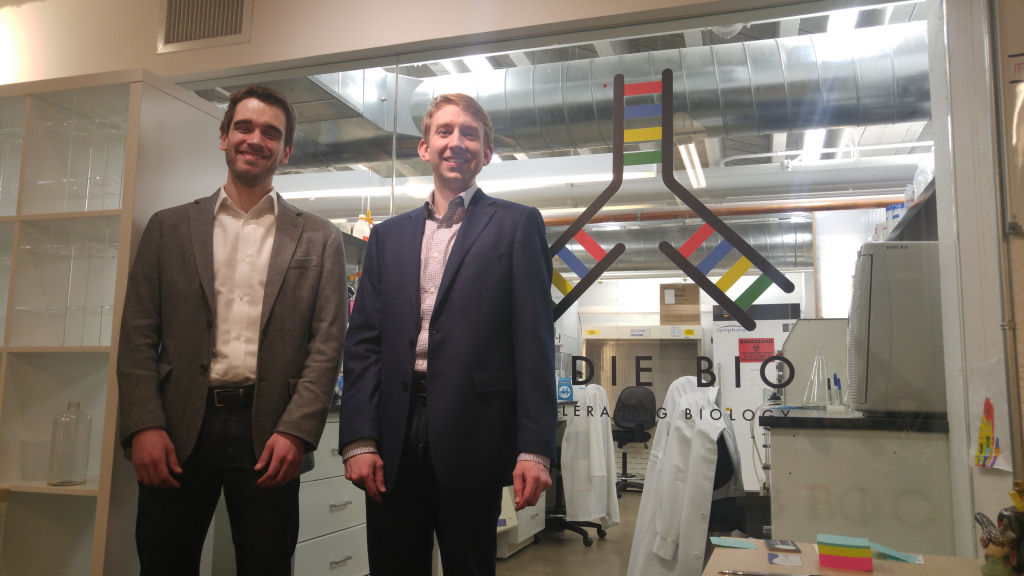UChicago Microbiome Startup Making Strides in Life Sciences Accelerator IndieBio

After just one year, a UChicago startup supported by the Polsky Center for Entrepreneurship and Innovation has built its proof of concept, filed for patents, and secured both funding and a competitive spot in IndieBio, a leading life science accelerator.
BiomeSense, which aims to revolutionize data collection and analysis of microbial genomes – the microbes essential to health, digestion and immunity – is spending the next couple of months in San Francisco as part of IndieBio’s current accelerator class.
“Our vision is that [the microbiome] monitoring platform we’re creating becomes routine, so that the data could be used as an early-warning sign, a treatment, or perhaps even more — identifying problems earlier and accelerating the time to health solutions,” said Glenview native Kevin Honaker, MBA ’17, BiomeSense CEO and cofounder. The company’s other cofounders are Savas Tay, an associate professor at the University of Chicago’s Institute of Molecular Engineering and Institute for Genomics and Systems Biology, and Jack Gilbert who is now a professor of pediatrics at the Scripps Institution of Oceanography at the University of California at San Diego.
Dylan Nichols, the startup’s lead engineer, said BiomeSense’s work is invigorating because so little data is available, making the field wide-open for finding links between people’s gut bacteria and certain illnesses – and possible ways to stop the illnesses or provide earlier, more effective treatments.
The first step is to help doctors and researchers get more data so they can find causal links – not just correlations – between microbiomes and health conditions ranging from cognitive development to cancer.
“We want to produce enough data to counteract the kinds of false leads we have today,” remarked Nichols. “What gets discovered first? We don’t yet know. Links to obesity, depression, colon cancer, Parkinson’s, arthritis?”
Both Honaker and Nichols decided to forego more lucrative jobs because they enjoy the freedom and potential of the startup world, and have a passion for taking a concept from idea to commercialization.
Their company’s breakthroughs start with replacing what amounts to patients having to fumble to collect their own stool sample when they go to the bathroom, being sure not to let the sample touch the inside of the toilet, and then mail the sample back to a lab for testing.
BiomeSense is developing a biosensor that would fit in the toilet – indeed, the long-term goal is for it to be an everyday bathroom accessory – and examine one’s bowel movement in real time. The sensor would then send its detailed analysis to a data collection site in the cloud, eliminating any human involvement.
That’s important because today’s patients do very poorly in adhering to their stool sample-collection duties, much less sending their stool samples back to the lab. That means the data goes lacking.
“Data efficiency is the missing link,” Honaker said. “Despite years of research and thousands of published studies, microbiome [links to people’s health] is more hype than reality. Unlike our genes, our microbiome changes every day. We don’t understand it enough to make the clinical ‘next step.’ So I like that we’re working to power the research, to help [researchers and doctors] find the answers.”
Today’s manual stool sampling also costs money – typically, at least $100 per test to cover the costs of the test, shipping, and professionals to conduct assays at an outside lab.
BiomeSense’s platform – comprised of hardware, software and analytics – is designed to significantly lower the cost of testing so that far more data can be generated over a given time period.
So how would such a sensor – being developed at the University of Chicago – keep from being flushed or pawed by a pet or a curious child?
“That’s part of the design and engineering challenge we’re addressing,” Honaker said.
And what about entrepreneurs developing pills that people swallow to try to parse their gut bacteria?
Honaker said. “They’re so many years away from being viable; investigators need data right now.”
BiomeSense took advantage of the many networking, programs and resources of the Polsky Center such as the Polsky I-Corps program and its recently launched Polsky Life Sciences Launchpad. BiomeSense also competed and won $250,000 in funding from the Polsky Center’s George Shultz innovation Fund, which provides proof-of-concept funding for early-stage ventures. In addition, the timing of the University’s 2017 gift of $100 million from the The Duchossois Group Inc. Chairman and CEO Craig Duchossois, his wife, Janet Duchossois, and The Duchossois Family Foundation also contributed to the team’s early momentum. That gift created the Duchossois Family Institute, which seeks to accelerate research that combines genetics, immunology and microbiome to create a new science of wellness.
Today, BiomeSense is one of 11 teams participating in IndieBio’s 4-month accelerator, which is based in San Francisco and recognized as a leading life sciences accelerator that has funded 105 biotech startups since March 2015. The BiomeSense team plans to leverage the program – and the funding it provides – to continue to build momentum, secure pilots, hire engineers, line up investors, and develop a prototype by year’s end.
“Our ultimate goal is to empower all researchers, no matter what question they’re trying to answer,” said Honaker. “At the end of the day, what excites us the most is the opportunity to see what clinical breakthroughs can be discovered with our help.”